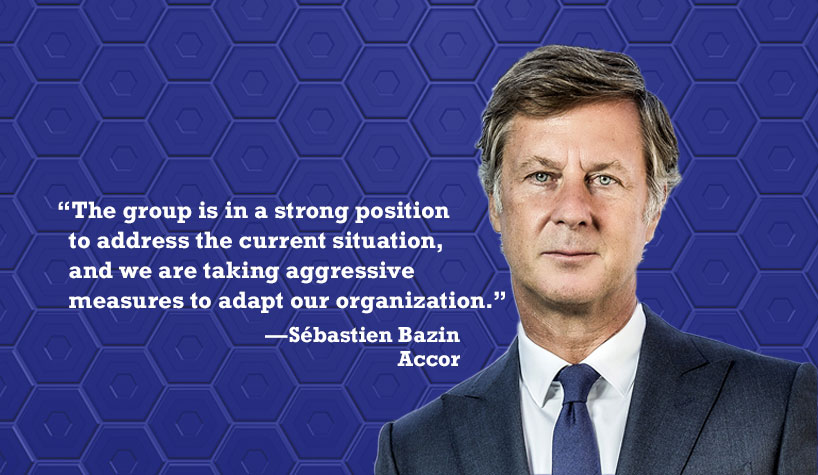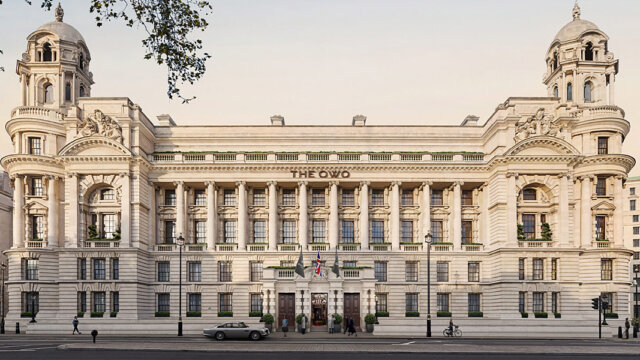PARIS—Accor revealed that its consolidated first-quarter 2020 revenue totaled 768 million euros ($830 million), down 17% and 15.8% like-for-like. RevPAR fell by 25.4%, reflecting the sharp deterioration in the environment due to the worldwide spread of the COVID-19 pandemic, first in Asia-Pacific (-33.7%) and then in other regions, including Europe (-23.2%) and North America (-22.2%).
Changes in the scope of consolidation (acquisitions and disposals) had a negative impact of -7 million euros (-$7.6 million) largely due to the disposal of Mövenpick leased hotels. Currency effects had a negative impact of -4 million euros (-$4.3 million), mainly due to the Australian dollar (-4.2%) offset by the U.S. dollar (+3.0%).
During Q1 2020, Accor opened 58 hotels, representing 8,000 rooms. At the end of March, the group had a portfolio of 746,903 rooms (5,085 hotels) and a pipeline of 208,000 rooms (1,202 hotels), of which 76% are in emerging markets. As of April 22, 62% of the group’s hotels are closed (more than 3,100 units).
“The world is facing an unprecedented health crisis that is having massive and unique impacts on the tourism industry. Nearly two-thirds of our hotels are currently closed, and most of the others are being used to support healthcare workers and all those on the front lines of the fight against COVID-19,” said Sébastien Bazin, chairman/CEO of Accor. “Against this backdrop, the efforts of our employees and our owners have been extraordinary. Today, our challenge is twofold: Manage the emergency and prepare for the rebound.”
He continued, “The group is in a strong position to address the current situation, and we are taking aggressive measures to adapt our organization. Accor’s recent transformation has left the group with a robust balance sheet, which will enable it to absorb the economic consequences of this crisis in the coming quarters. At the same time, we are preparing for the recovery alongside the authorities and professional organizations in the countries in which we operate so that the group will be well positioned to rebound as quickly as possible.”
HotelServices
HotelServices, which operated 5,085 hotels (746,903 rooms) under franchise agreements and management contracts at the end of March, reported a 17.5% like-for-like decrease in revenue, to 540 million euros ($583 million). This decline reflects the rapid COVID-19-related deterioration in RevPAR. Revenue in the management & franchise (M&F) business was down 34.9%, with performance hit by the gradual spread of the virus in various regions.
Consolidated RevPAR was down 25.4% overall in the quarter, including a 62.6% decline in March alone, after a 2.0% increase in January and a 10.2% decrease in February. RevPAR’s impact on M&F revenue was compounded by the significant decline in incentive bonuses based on hotels’ gross operating profit.
M&F revenue was down by a sharp 31.2% like-for-like in Europe, reflecting a 23.2% deterioration in RevPAR. Here is the breakdown:
- In France, RevPAR fell 22.4% in Q1. Paris and the regional cities saw similar declines of -22.3% and -22.4%, respectively. The lockdown implemented since March 17 led to the temporary closure of more than 75% of Accor hotels in France.
- In the U.K., RevPAR declined by 22.1%. London was more affected than the regional cities with RevPAR down 23.9% and 19.7%, respectively. Most hotels have been closed since March 25.
- In Germany, where protective measures were put in place on March 22, the impact on RevPAR was similar, reflecting a 24.5% decline for the quarter.
- Spain, which went into lockdown on March 14, reported a 29% drop in RevPAR in the first quarter.
In Asia-Pacific, RevPAR was down 33.7%, reflecting the deterioration that began a month earlier than in Europe. Here is the breakdown:
- In China, RevPAR fell by 67.7% in Q1. The epicenter of the pandemic is still affected by COVID-19, but initial signs of an improvement can be seen in the pick-up in occupancy rates and in the restaurant business. Average prices remain low as the rooms are mainly being used by medical personnel or for quarantine measures.
- In Australia, where COVID-19 has had a more limited impact, the decline in RevPAR was somewhat less pronounced at 18.2%. This decline was also mitigated by the hotels being used for quarantine, which had a positive short-term impact on RevPAR.
In the Middle East & Africa, RevPAR was down 21.4%. The trend was similar to Europe’s due to the closure of the holy cities since the end of February.
RevPAR in North America, Central America & the Caribbean was affected by the closure of numerous hotels since mid-March due to the COVID-19 pandemic and was down 22.2%.
Lastly, business has so far proven more resilient in South America, with a RevPAR decline of 11.2%. However, this resilience reflects the time lag in the spread of the pandemic.
The group nevertheless continues to expand at a rapid pace. During Q1, Accor opened 58 hotels, representing nearly 8,000 rooms. At the end of March, the pipeline was stable and comprised 1,202 hotels and 208,000 rooms, of which 76% are in emerging markets.


